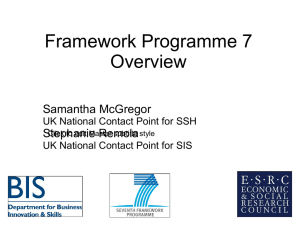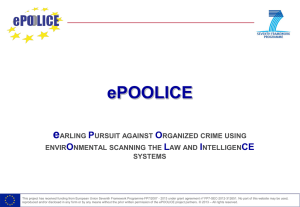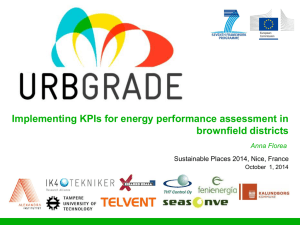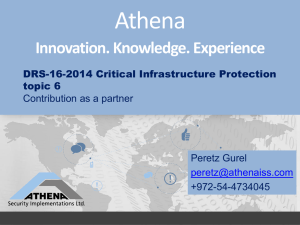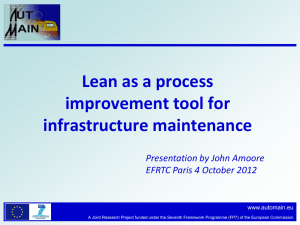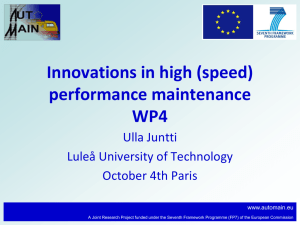Inspection
advertisement
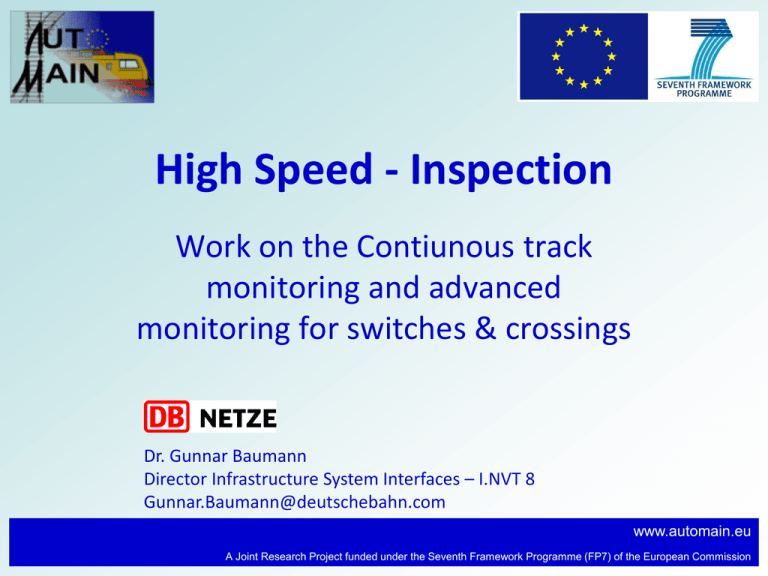
High Speed - Inspection Work on the Contiunous track monitoring and advanced monitoring for switches & crossings Dr. Gunnar Baumann Director Infrastructure System Interfaces – I.NVT 8 Gunnar.Baumann@deutschebahn.com www.automain.eu A Joint Research Project funded under the Seventh Framework Programme (FP7) of the European Commission Aims Aims Unplanned and planned non-availability of the track caused by failures or restrictions are cost-drivers in the networks. A prediction of failures allows an optimisation of the instant of time, where the work is economical in a larger part of the track. Larger maintenance sections reduce the costs and provide usually a better quality !!! Switches are most critical devices in the network concerning availability and costs. A reduction of failures are direct noticeable by the passenger or the logistic company. www.automain.eu A Joint Research Project funded under the Seventh Framework Programme (FP7) of the European Commission Solutions Solutions Monitoring of track alignment by regular sheduled trains during operation to get „Online“-Information of the track. On this basis a prognosis of the deterioration of single faults is possible and a maintenance planning for the line is more economical. Monitoring and inspection of switches will give an individual information about the „Health“ of a switch. Maintenance intervention before any faults are possible, maintenance staff will be equipped with the spare-parts needed. Traffic interruption caused by switches will be reduced. www.automain.eu A Joint Research Project funded under the Seventh Framework Programme (FP7) of the European Commission WP 3 Organisation WP 3 Organisation WP 3.1 In-Service Measurement (ISM): Measurement of the track alignment by an in-service freight locomotive in the demonstrator. Line will be Rotterdam (Nl) – Dillingen (D). Data processing for failure prediction and the display to the maintenance staff (MMI). WP 3.2 Switch: Monitoring and inspection of switches by intelligent sensors and failure prediction by modern algorithms and the display to the maintenance staff (MMI). Demonstrators are switches in Eslöv (S). WP 3 Partners: ProRail, Network Rail, Deutsche Bahn, Trafikverket, Strukton Rail, Damill, Birmingham Univ., Luleå Tekniska Univ., DLR, Mermec, Vossloh www.automain.eu A Joint Research Project funded under the Seventh Framework Programme (FP7) of the European Commission WP 3 Organisation Delivering of track recording data DB / MER Delivery of switch data UoB / DAM Demonstrators Algorithms for failure prediction DLR / UoB Development of Algoritms UoB Prediction of opt. time for Mainten. DLR / UoB Development of Maintenance Prog. Stru / LTU Programming of the MMI VCSA Workflow Input for WP2, WP4, WP5 www.automain.eu A Joint Research Project funded under the Seventh Framework Programme (FP7) of the European Commission Advantages of ISM Advantages Reduction of service breakdown and delays by early detection of defects Measured data are automatically stored in a maintenance database Prediction of defect development (more frequently measurements) Early maintenance planning due to defect/failure prediction (Single defect tamping vs. line tamping) Verify the quality of repair efforts (close control loop) Measurement is a “by-product (spin-off) of train operation” Improvement of maintenance management Reduction of costs (LCC) From “Find and Fix” to “Predict and Prevent” High Availability of the Freight-Backbones of the ports (Target of FP 7 !) www.automain.eu A Joint Research Project funded under the Seventh Framework Programme (FP7) of the European Commission Equipment of ISM Continuous monitoring of track geometry on Freight Loko (BR 189) Location with GPS Data transmission by radio Freight train Acceleration sensors on axle bearing Onboard-computer module (IPC) IMU (Gyroscope) www.automain.eu A Joint Research Project funded under the Seventh Framework Programme (FP7) of the European Commission Corridor for demonstrator Ore line Rotterdam - Dillingen Dillingen/ Saar Quelle:Verkehrsrundschau.de Foto: A. Seidel www.automain.eu A Joint Research Project funded under the Seventh Framework Programme (FP7) of the European Commission Corridor for demonstrator Ore-line Rotterdam - Dillingen Decision was done due to the automatic coupling of the lokomotive fixed schedule for the ore-line Foto: bahn007.startbilder.de www.automain.eu A Joint Research Project funded under the Seventh Framework Programme (FP7) of the European Commission Processing of the acc.-data Processing of the acceleration data To gain the vertical alignment from the acceleration data, a double integration has to be carried out. Algorithms were applied to minimize sensor errors. Still, different measurement runs could not easily be compared, see the Fig. left side. Fig: Vertical alignment of several measurement runs before (left) and after (right, zoomed in) filtering Quelle: DLR www.automain.eu A Joint Research Project funded under the Seventh Framework Programme (FP7) of the European Commission Defect/Failure prediction Defect growth prediction Strecke 1700-1; km 136,1 3-Punkt-Signal - linke Schiene [mm] Vertical Deviation of track alignment [mm] 12 Predicted exceeding of the Limit value Limit value (11 mm) 11 10 In-service measurement (ISM) 9 Inspection measurement (Railab) Mid-October 8 Date of the predicted exceeding of the limit value 7 6 Jul07 Jul Aug07 Aug Sep07 Sep Oct07 Oct Datum Nov07 Nov Dec07 Dec Date www.automain.eu A Joint Research Project funded under the Seventh Framework Programme (FP7) of the European Commission Monitoring of defects Sustainable maintenance: Längshöhe (3Punkt) in mm, beurteilt nach Ril 821.2001, (vzg=200km/h) 11 1 1 11 1 1 2 2 1 8 1 4 1 3 1 3 1 1 2 1 1 01-Jun-2007 1 1 1 1 1 2 1 1 2 3 1 1 3 2 2 1 1 1 3 4 1 2 1 11 1 2 1 1 1 3 1 1 1 1 1 1 3 1 2 5 3 1 1 3 1 2 1 2 2 1 2 1 1 2 1 1 1 4 2 3 1 1 3 1 1 135.81 135.82 km auf Strecke 1700-2 3 2 1 1 2 135.8 3 1 1 1 1 1 1 3 2 5 2 2 135.79 4 2 2 2 2 2 1 01-Jan-2008 1 4 1 1 1 1 01-Dec-2007 1 5 1 1 2 01-Feb-2008 6 3 1 3 1 1 1 01-Oct-2007 Date 1 2 3 1 4 5 2 Datum 01-Sep-2007 7 1 1 1 01-Aug-2007 01-Nov-2007 12 2 1 1 2 1 1 1 2 01-Jul-2007 Vertical Deviation of track alignment [mm] 8594 15 6 11 23 11 2 2 9 1 1 5 3 1 13 2 1 3 1 23 6798 1 7 1 1 1 1 1 10 8 7 2 1 1 109 43 76 17 16 15 54 1 1 18 14 12 10 1 2 43 6 5 423 1 1 1 1 01-May-2007 1 1 2 3 3 4 1 01-Apr-2007 52364 1 01-Mar-2007 135.83 135.84 1 135.85 0 Track position [km] www.automain.eu A Joint Research Project funded under the Seventh Framework Programme (FP7) of the European Commission Switches & Crossings SP 3.2 Monitoring & intelligent self-inspection of switches Switch inspection with special staff for the signalling and the track part causes a lot of logistic and economical effort Inspections are carried out in fixed time periods – The condition of the individual switch is not respected – Sudden defects will be undetected until the next inspection or produced a failure Prediction of development of defects is difficult Monitoring is different than Self-Inspecting www.automain.eu A Joint Research Project funded under the Seventh Framework Programme (FP7) of the European Commission Modular Self-Inspecting Infrastructure – Switches Condition monitoring Automatic inspection Orientated on the fault and it can do: - fault detection: a system is able to detect a fault which is happening - fault diagnosis: a system is able to diagnose the fault - fault prediction: the system is able the predict a fault a certain amount of time before it will happen Focussed on inspecting the asset according to inspection standards and it can: - identify the assets that do not meet the standards - carry out inspections specified in inspection standards - carry out the inspections in a way that satisfies the inspection requirements (e.g. precision of measurement) www.automain.eu A Joint Research Project funded under the Seventh Framework Programme (FP7) of the European Commission Modular Self-Inspecting Infrastructure – Switches Condition monitoring 1. 2. 3. Measures parameters that reveal faults in the system. Analyse the data and identify the faults or predict potential faults. Develop a cost effective system. The drive is to use the smallest number of sensors to identify the largest number of faults. Automatic inspection 1. 2. 3. Measure parameters specified by inspection standards. Parameters must be measured must be in line with the standards. The drive is to eliminate the need for maintenance personnel to inspect switches in person. www.automain.eu A Joint Research Project funded under the Seventh Framework Programme (FP7) of the European Commission Summary of self inspecting switch: Review of inspection tasks Shape, size, gauge and position of rails Potential solution Laser measurements Visual inspection Potential solution Video train Point machine inspection Potential solution Improved CM Cracks in rails and crossing Potential solutions ??? Switch rail fittings (bolt loosening, cracks) Potential solution ??? www.automain.eu A Joint Research Project funded under the Seventh Framework Programme (FP7) of the European Commission Architecture of the MMI (Man-Machine-Interface) www.automain.eu A Joint Research Project funded under the Seventh Framework Programme (FP7) of the European Commission MMI data flow Used in WP6 for demonstration Track data (scenario 1) MERMEC/UoB system Maintenance workers Track data (scenario 2) DLR/DB system MTN Task Switch data (scenario 3) UoB system RailML + HTTPS MMI Vossloh Infrastructure managers Scheduling Tool (WP5) SNCF Switch data (scenario 4) Damill system Switch data (scenario 5) Struckton system www.automain.eu A Joint Research Project funded under the Seventh Framework Programme (FP7) of the European Commission MMI architecture Used in WP6 for demonstration www.automain.eu A Joint Research Project funded under the Seventh Framework Programme (FP7) of the European Commission Maintenance task definition The MMI is a “task management system”. The level of data managed by the MMI is a maintenance task. From ISO13374-1:2003 (Condition monitoring and diagnostics of machines — Data processing, communication and presentation — Part 1: General guidelines) the level of data for a maintenance task is defined as a recommended action. www.automain.eu A Joint Research Project funded under the Seventh Framework Programme (FP7) of the European Commission Maintenance task process Maintenance task process www.automain.eu A Joint Research Project funded under the Seventh Framework Programme (FP7) of the European Commission RailML data standard www.railml.org Since 2001: The railML.org Initiative was founded against the background of the chronic difficulty of connecting different railway IT applications. Its main objective is to enable heterogeneous railway applications to communicate with each other. Today, the connection of various railway software packages is beset with problems. The purpose of the railML.org Initiative has been to find, discuss and present systematic, XML-based solutions for simplified data exchange between railway applications. First step in european standardisation for maintenance IT-tools MERMEC has already provided lists of standard defects and standard measurements. www.automain.eu A Joint Research Project funded under the Seventh Framework Programme (FP7) of the European Commission RailML data standard State of the art in AUTOMAIN The RailML schema was agreed by all partners The level of data is “the maintenance task”. Every demonstrator has to decide the way of communication: The monitoring inspection systems must send a maintenance task to the MMI The monitoring inspection systems send a failure to the MMI, and a “translation table” validated by the maintenance will match the tasks in relation to the failure produced. Every system must send a message to confirm the system is alive A draft of a XML schema exists to understand The RailML standard will be a data schema file (XSD file). When it is mature (approved by demonstration), it will be proposed to the official RailML organization. www.automain.eu A Joint Research Project funded under the Seventh Framework Programme (FP7) of the European Commission Map for Tasks The assets have colours and description for the flag: No flag if no task RED Flag: Needing corrective maintenance. ORANGE Flag: Needing preventative maintenance For the scheduled maintenance, the asset will be “orange” when it’s time to do it and red when it’s too late. For the conditional maintenance, the asset will be “orange” when it appears (alarm from a system, expert report...) www.automain.eu A Joint Research Project funded under the Seventh Framework Programme (FP7) of the European Commission Specifications MMI main features 1 unique access for all the systems monitoring assets (through Internet) 1 unique level of data : maintenance task Map with the status of the maintenance tasks for several assets Table with the status of the maintenance tasks for several assets Inspection report on site (questionnaire on site to perform the maintenance task ) MMI administration Import/export infrastructure RailML data RailML “maintenance tasks ” exchange between applications Send emails, SMS, etc... to the maintenance team when a task needs it Allow confirmation by maintenance to take the work in charge Monitors the availibility of the systems (message to know if each system is still alive) www.automain.eu A Joint Research Project funded under the Seventh Framework Programme (FP7) of the European Commission … 18 months left Thank you for your attention! www.automain.eu A Joint Research Project funded under the Seventh Framework Programme (FP7) of the European Commission
